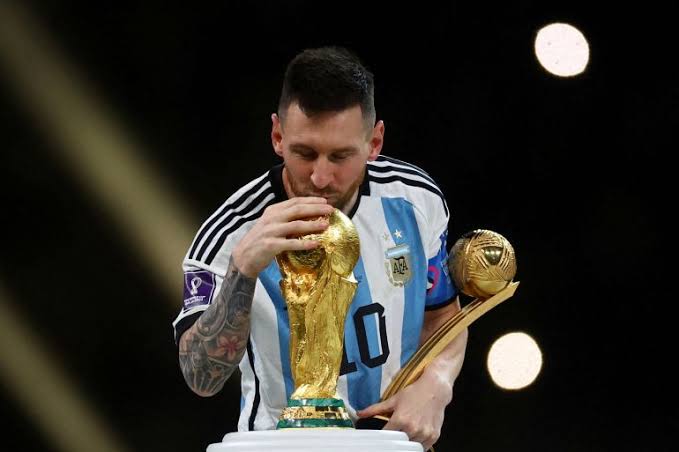Joey Barton has stirred up controversy with his recent comments, suggesting Lionel Messi’s extraordinary football feats should come with an asterisk due to his childhood treatment for a rare growth hormone deficiency, Soccernet.football reports.
Messi, hailed as one of football’s greatest icons, boasts an impressive tally of eight Ballon d’Or awards and has left an indelible mark on the sport over the past decade.
His remarkable time at Barcelona cemented his status as the club’s top player and all-time leading scorer.
Additionally, he steered Argentina to World Cup victory in 2022, breaking a dry spell dating back to Diego Maradona’s triumph in 1986.
Former Newcastle United midfielder Barton, though, contends that Messi’s legacy is tainted by what he perceives as genetic alteration through early medical intervention.
Speaking candidly on his Common Sense Podcast, Barton remarked, “He’s asterisk though for me.”He’s asterisk though, for me.
“There’s a big asterisk on Messi’s name for me because he got on the steroids and all that at a young age to mess with his growth.
“Messi’s been genetically modified at a young age, so there has to be an asterisk next to his name.
“He was given growth hormone and all kinds of medications to help him grow. As far as I know, no one else has done that. So, if you’d have left him grow naturally and left him on the roast dinners – or whatever – he wouldn’t have been big enough to end up doing what he’s ended up doing.”
Messi’s childhood ordeal with growth hormone deficiency was a significant hurdle, costing $1000 a month for treatment, initially covered by his father’s health insurance.
However, when funds ran short, Messi’s father sought opportunities, eventually landing a trial at Barcelona, where medical support was available, leading to Messi’s meteoric rise in football.
Barton argues that Messi’s treatment provided him an unfair advantage, suggesting doubts about the authenticity of his achievements.Joey Barton has stirred up controversy with his recent comments, suggesting Lionel Messi’s extraordinary football feats should come with an asterisk due to his childhood treatment for a rare growth hormone deficiency, Soccernet.football reports.
Messi, hailed as one of football’s greatest icons, boasts an impressive tally of eight Ballon d’Or awards and has left an indelible mark on the sport over the past decade.
His remarkable time at Barcelona cemented his status as the club’s top player and all-time leading scorer.
Additionally, he steered Argentina to World Cup victory in 2022, breaking a dry spell dating back to Diego Maradona’s triumph in 1986.
Former Newcastle United midfielder Barton, though, contends that Messi’s legacy is tainted by what he perceives as genetic alteration through early medical intervention.
Speaking candidly on his Common Sense Podcast, Barton remarked, “He’s asterisk though for me.”He’s asterisk though, for me.
“There’s a big asterisk on Messi’s name for me because he got on the steroids and all that at a young age to mess with his growth.
“Messi’s been genetically modified at a young age, so there has to be an asterisk next to his name.
“He was given growth hormone and all kinds of medications to help him grow. As far as I know, no one else has done that. So, if you’d have left him grow naturally and left him on the roast dinners – or whatever – he wouldn’t have been big enough to end up doing what he’s ended up doing.”
Messi’s childhood ordeal with growth hormone deficiency was a significant hurdle, costing $1000 a month for treatment, initially covered by his father’s health insurance.
However, when funds ran short, Messi’s father sought opportunities, eventually landing a trial at Barcelona, where medical support was available, leading to Messi’s meteoric rise in football.
Barton argues that Messi’s treatment provided him an unfair advantage, suggesting doubts about the authenticity of his achievements.
Messi, hailed as one of football’s greatest icons, boasts an impressive tally of eight Ballon d’Or awards and has left an indelible mark on the sport over the past decade.
His remarkable time at Barcelona cemented his status as the club’s top player and all-time leading scorer.
Additionally, he steered Argentina to World Cup victory in 2022, breaking a dry spell dating back to Diego Maradona’s triumph in 1986.
Former Newcastle United midfielder Barton, though, contends that Messi’s legacy is tainted by what he perceives as genetic alteration through early medical intervention.
Speaking candidly on his Common Sense Podcast, Barton remarked, “He’s asterisk though for me.”He’s asterisk though, for me.
“There’s a big asterisk on Messi’s name for me because he got on the steroids and all that at a young age to mess with his growth.
“Messi’s been genetically modified at a young age, so there has to be an asterisk next to his name.
“He was given growth hormone and all kinds of medications to help him grow. As far as I know, no one else has done that. So, if you’d have left him grow naturally and left him on the roast dinners – or whatever – he wouldn’t have been big enough to end up doing what he’s ended up doing.”
Messi’s childhood ordeal with growth hormone deficiency was a significant hurdle, costing $1000 a month for treatment, initially covered by his father’s health insurance.
However, when funds ran short, Messi’s father sought opportunities, eventually landing a trial at Barcelona, where medical support was available, leading to Messi’s meteoric rise in football.
Barton argues that Messi’s treatment provided him an unfair advantage, suggesting doubts about the authenticity of his achievements.Joey Barton has stirred up controversy with his recent comments, suggesting Lionel Messi’s extraordinary football feats should come with an asterisk due to his childhood treatment for a rare growth hormone deficiency, Soccernet.football reports.
Messi, hailed as one of football’s greatest icons, boasts an impressive tally of eight Ballon d’Or awards and has left an indelible mark on the sport over the past decade.
His remarkable time at Barcelona cemented his status as the club’s top player and all-time leading scorer.
Additionally, he steered Argentina to World Cup victory in 2022, breaking a dry spell dating back to Diego Maradona’s triumph in 1986.
Former Newcastle United midfielder Barton, though, contends that Messi’s legacy is tainted by what he perceives as genetic alteration through early medical intervention.
Speaking candidly on his Common Sense Podcast, Barton remarked, “He’s asterisk though for me.”He’s asterisk though, for me.
“There’s a big asterisk on Messi’s name for me because he got on the steroids and all that at a young age to mess with his growth.
“Messi’s been genetically modified at a young age, so there has to be an asterisk next to his name.
“He was given growth hormone and all kinds of medications to help him grow. As far as I know, no one else has done that. So, if you’d have left him grow naturally and left him on the roast dinners – or whatever – he wouldn’t have been big enough to end up doing what he’s ended up doing.”
Messi’s childhood ordeal with growth hormone deficiency was a significant hurdle, costing $1000 a month for treatment, initially covered by his father’s health insurance.
However, when funds ran short, Messi’s father sought opportunities, eventually landing a trial at Barcelona, where medical support was available, leading to Messi’s meteoric rise in football.
Barton argues that Messi’s treatment provided him an unfair advantage, suggesting doubts about the authenticity of his achievements.




















Your point of view caught my eye and was very interesting. Thanks. I have a question for you.